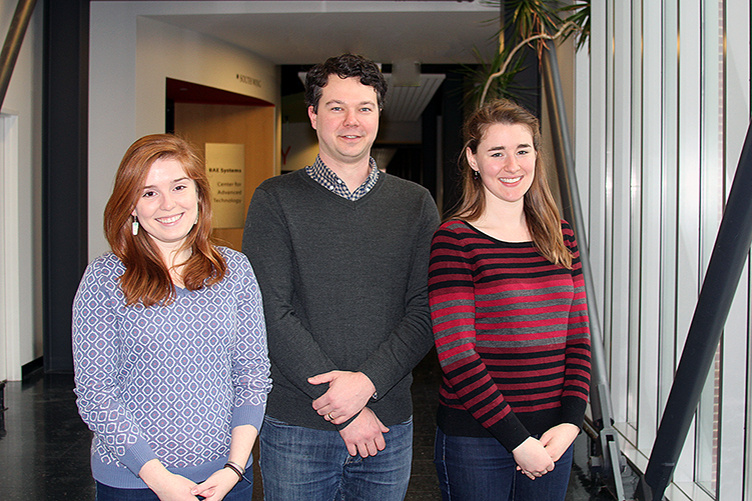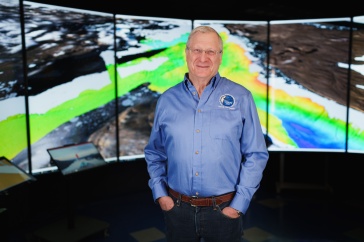
Clarice Perryman, Scott Loranger and Elizabeth Weidner (l-r), all Ph.D. students at UNH, received Outstanding Student Paper Awards at the American Geophysical Union Fall Meeting in December.
Three UNH graduate students received Outstanding Student Paper Awards at the American Geophysical Union Fall Meeting in December.
Clarice Perryman, a Ph.D. student in the Natural Resources and Earth Systems Science program, Elizabeth Weidner, a Ph.D. student in oceanography, and Scott Loranger, also a Ph.D. student in oceanography, received the recognition. It’s the second time in three years that multiple UNH students have received these awards.
“We’re very proud of our students, who successfully continued the tradition of award-winning presentations at AGU,” says Julie Bryce, chair of the department of Earth sciences. “The excellent research undertaken by our students was well represented across the Earth, environmental and ocean sciences.”
Harlan Spence, director of the Institute for the Study of Earth, Oceans & Space (EOS) and professor of physics, says only a small percentage of submitted papers receive an award. Multiple wins puts UNH in elite company among its peers domestically and across the globe.
“This is a great accomplishment this year, but we’ve been consistently taking home these awards for many years running,” says Spence. “This is a tribute to both the faculty and students.”
Clarice Perryman
Clarice Perryman won for her paper titled “Illuminating Geochemical Controls of Methane Oxidation Along a Gradient of Permafrost Thaw.” She is also the recipient of a National Science Foundation Graduate Research Fellowship. Perryman’s advisor is Ruth Varner, a professor in the Earth Systems Research Center and Earth sciences.
Perryman’s research investigated bacterial methane oxidation (consumption) in a thawing permafrost peatland in Abisko, Sweden. Her goal was to determine what geochemical factors most strongly influence rates of methane oxidation. The fieldwork allowed her to collect a thorough and unique data set, as well as establish friendships and collaborations with many new colleagues.
“Getting to spend the summer in Abisko is an experience like no other,” says Perryman. “The landscape is beautiful, the sun never sets and there are dozens of graduate students and faculty from institutions all over the world living and working at the research station.”
Elizabeth Weidner
Elizabeth Weidner won for her paper titled “A Multi-frequency Investigation of the Influences of Groundwater Discharge on Hydrocarbon Emission and Transport in the Baltic Sea.” She won the same AGU award last year and was honored with a best student paper award at the Acoustical Society of America meeting, also in December.
Weidner’s advisors include Tom Weber, associate professor of mechanical engineering at the Center for Coastal and Ocean Mapping and Joint Hydrographic Center, Larry Mayer, director of the School of Marine Science and Ocean Engineering and the Center for Coastal and Ocean Mapping (CCOM), and Martin Jakobsson, professor of marine geology and geophysics in the department of geological sciences at Stockholm University in Sweden.
“It was an amazing experience living in Stockholm, working with the faculty, collecting data in the Baltic Sea and eating a lot of lingonberry jam.”
Weidner’s research aims to distinguish marine seeps composed of gas from those composed of fresh water (groundwater) using high-resolution broadband acoustic water column data. She is working with a data set from the southern Stockholm Archipelago, where there are indications that both groundwater and methane gas is seeping into the coastal ocean environment. The seep features she has identified appear closely tied to regions of suspected groundwater discharge, suggesting direct or indirect controls on gas emission pathways. Weidner is part of a joint degree program between UNH and Stockholm University.
“The program provided me with the opportunity to spend the summer in Sweden to start my Ph.D. research,” says Weidner. “It was an amazing experience living in Stockholm, working with the faculty, collecting data in the Baltic Sea and eating a lot of lingonberry jam.”
Scott Loranger
Scott Loranger won for his paper titled “Measurements of the Acoustic Properties of Oil in Order to Enhance Predictive Models of Acoustic Scattering.” Loranger’s advisor is Tom Weber, associate professor of mechanical engineering at CCOM.
Loranger’s research uses sonar to detect and quantify oil in the ocean, whether from natural seeps or man-made spills. The work he presented at AGU was about measurements of the properties of oil that determine how sound interacts with an oil droplet. The study, in collaboration with the Alaska Fisheries Science Center and Colorado State University, should improve models used by researchers and oil spill responders as well as enhance the tools that they use.
“It’s been an exciting and enlightening experience to work with scientists across difference disciplines who are interested in the same question, but for different scientific reasons,” says Loranger.
-
Written By:
Brooks Payette | College of Engineering and Physical Sciences
















































